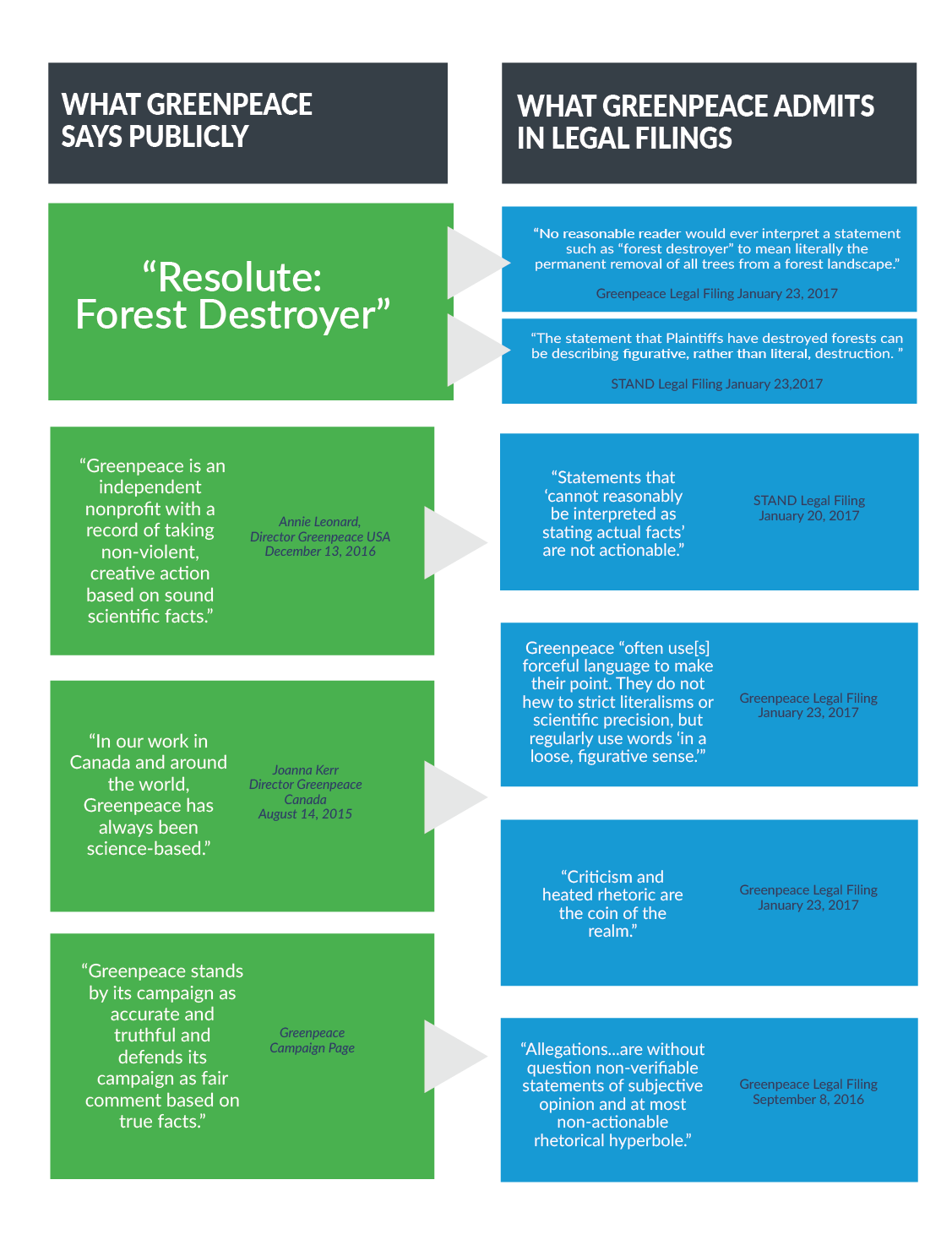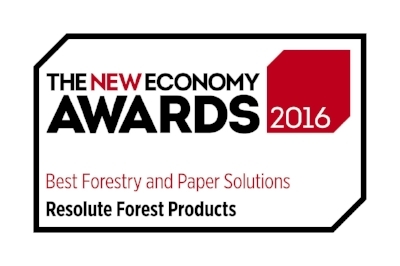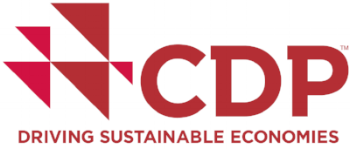While Greenpeace and its allies busy themselves with rhetorical gymnastics, they continue to display stunning hypocrisy when it comes to First Nations and other boreal communities.
Greenpeace admits its attacks on Resolute were ‘non-verifiable statements of subjective opinion’
Greenpeace and its allies have been waging a campaign based on the false claim that Resolute Forest Products is "destroying" the boreal forest. Now, they're admitting that their campaign amounts to "hyperbole" that doesn't adhere to “strict literalisms or scientific precision". In other words, exaggerations and lies.
Greenpeace publicly insists its claims are factual, but now, in formal legal filings in US Federal Court, calls its campaign more “figurative than literal” and blames the public for believing their “non-verifiable subjective opinion[s].”
Greenpeace is using claims about Resolute that it admits are not true to raise money from unaware donors. We have an obligation to set the record straight.
At Last, Greenpeace Admits to ‘Rhetorical Hyperbole’
A few years ago Greenpeace and allied groups chose my company, Resolute, Canada’s largest forest-products company, to be their next victim.
They compiled a litany of outlandish assertions: We were “forest destroyers,” for example, aggravating climate change, and causing a “caribou death spiral and extinction” in Canada’s boreal habitat. Greenpeace harassed companies we do business with, threatening them with the same sort of smear campaign that they launched against us and even instigating cyber-attacks on their websites. And they bragged about the damage — $100 million, in Canadian dollars — that they claimed to have inflicted on our business.
They were lying about our forestry practices, so we did something that none of the group’s other targets have yet found the wherewithal to do: We sued them, in Canada, for defamation and intentional interference with economic relations, and in the United States under RICO statutes.
A funny thing happened when Greenpeace and allies were forced to account for their claims in court. They started changing their tune. Their condemnations of our forestry practices “do not hew to strict literalism or scientific precision,” as they concede in their latest legal filings. Their accusations against Resolute were instead “hyperbole,” “heated rhetoric,” and “non-verifiable statements of subjective opinion” that should not be taken “literally” or expose them to any legal liability. These are sober admissions after years of irresponsible attacks.
No “forest loss” was caused by Resolute, the groups concede — now that they are being held accountable. Of course, these late admissions are consistent with the findings of just about every independent journalist and commentator who has covered the dispute, from the Wall Street Journal editorial board to Enquête, a Canadian version, roughly, of 60 Minutes. Even Steve Forbes weighed in, calling our lawsuit “an outstanding example of how unfairly attacked companies should respond.” Peter Reich, one of the world’s leading forest ecologists, has said that Greenpeace has “a fundamental disregard for scientific reality.”
Finally hearing the truth from Greenpeace itself is vindication, even if it comes in the form of a tortured defense of its actions, rather than a simple apology. Remarkably, despite admitting in court that its rhetoric against Resolute is not true, Greenpeace continues to disparage us publicly and privately. Just a few weeks ago, we sent it a cease-and-desist letter demanding that it stop sending to our customers threatening letters accusing us of the “destruction of forests in Quebec and Ontario.”
Some news outlets in the United States have filed amicus briefs on behalf of Greenpeace, on free-speech grounds. But freedom of speech is not the same as libel and slander. And the public should ask the outlets when it can expect scrutinizing, critical coverage of what Greenpeace itself now admits are deceptive practices.
...
So far they have acted with virtual impunity and profited handsomely. One Greenpeace executive was even caught laughing on camera when he was confronted on a leading broadcast program with photos of a forest, affected by a wildfire, that the group erroneously said was “destroyed” by Resolute. It was morally wrong and yet another example that, as Greenpeace puts it, “heated rhetoric is the coin of the realm.”
For me, confronting this barrage of misinformation has been more than just about business ethics. It is very personal. I was raised in Quebec’s Saguenay–Lac-Saint-Jean region, where my family has lived for generations. I harvested trees by hand to pay my way through school. Now 50 years later, those forest areas are again ready for harvest, and someday I will retire to this same land that my great-grandfather tilled.
Greenpeace is marauding not just our company but a way of life, one built on nurturing healthy forests that are the lifeblood of the people who live there. That’s why union leaders, small-business people, First Nations chiefs, and mayors and other government officials, of all political stripes, have written Greenpeace, imploring it to halt its campaign of misinformation. In nearly every instance, Greenpeace lacked the simple decency to respond, apparently indifferent to the human consequences of its actions.
Last summer, nearly 5,000 people marched through the streets of the small northern Quebec town of Saint-Félicien, demanding an end to Greenpeace’s disingenuous market campaign. Recognizing that the very viability of their communities are now held in the balance, local leaders have even “extended a hand” for eco-activists to have a dialogue with them. It is telling that Greenpeace neither showed up nor responded.
As a chief executive, I often meet and engage personally with our devoted employees at the local level, in the forests where they live and work. I know we share a common interest and a responsibility to sustain the forests for tomorrow. That’s why we’re not going to let Greenpeace get away with using “rhetorical hyperbole” to make false and damaging accusations from hundreds and thousands of miles away, in its glass-walled towers in Amsterdam, Hamburg, and Washington, D.C.
We’re going to stand tall, both in public discourse and in the courts. For my part, my guiding hope is to return to the forest with the ability to face my neighbors, my family, and my community and tell them that I stood up and told the truth.
Richard Garneau, President & CEO of Resolute Forest Products, National Review Online (3/2/2017)
NRDC Attacks Harm boreal communities
NRDC recently posted the first of a six part blog series by its “Canada expert” Anthony Swift, an American attorney in Washington, DC. It is riddled with inaccuracies, misleading claims, and bias.
Here are just a few of the most egregious examples:
Swift makes the assertion that the boreal “plays a significant role in helping to regulate the global climate by holding at bay massive amounts of greenhouse gases emissions.”
Swift fails to mention that forest management actually enhances the boreal’s ability to absorb greenhouse gases, as recognized by the U.N. International Panel on Climate Change.
He also leaves out that Resolute has been an industry leader in reducing greenhouse gas emissions, cutting its carbon footprint by 73% since 2000.
Next, Swift purposefully conflates forestry terms, stating “logging plays a major role in the degradation [of the boreal forest].”
What Swift calls ‘degradation’ includes natural disturbances like fires, insects, or disease, and is not synonymous with deforestation.
Less than 0.5% of Canada’s boreal forest is harvested each year and Canada’s annual deforestation rate is less than 0.02%.
He implies Resolute’s practices have “direly threatened woodland caribou” in the Canadian boreal. And later revisits the claim, bemoaning Resolute’s “lack of faith in following through on its commitment to ensure caribou survival.”
There are more caribou in Canada than deer, moose, and elk combined. With nearly 4 million caribou spread across the country, they represent the most abundant wild hoofed animal in Canada.
In fact, the majority of the herds in the provinces where Resolute operates are considered “as likely as not to be self-sustaining” or “likely to be self-sustaining.”
Swift asserts that “Resolute has chosen to challenge freedom of speech and undermine meaningful dialogue with stakeholders engaged in proactive conservation efforts.”
Freedom of speech is not a license to slander, libel and defame. By Greenpeace’s own admission in recent legal filings, their campaign in the boreal consists of “non-verifiable statements of subjunctive/ subjective opinion” and “rhetorical hyperbole.”
We have attempted to resolve misleading activist campaigns through open discussion and now are taking our case to court where a judge and jury can decide on the legality of the conduct of Greenpeace and like-minded activists.
Swift then suggests “Resolute has now overseen a 46 percent decrease in the area of its woodlands certified by FSC.”
NRDC is crediting Resolute with managing over 5.5 million hectares more than we ever have. He also fails to note that we have discontinued management in a number of regions since 2012, as a result of mill closures, and therefore have not pursued forest management certification in the forests supporting those former operations.
He then claims “Resolute’s actions have also led to its loss of recognition by leading conservation groups.”
Resolute’s award-winning forest management practices were recognized internationally throughout 2016.
Next, Swift implies Resolute’s award-winning forestry management has “resulted in an extraordinarily hostile approach to civil society organizations and reflect a striking unwillingness to positively engage to identify credible and lasting conservation solutions.”
Collaboration is a hallmark of Resolute, but is it for NRDC?
Our collaborative efforts with communities, First Nations, NGOs, and a range of other stakeholders are the cornerstone of Resolute’s business approach.
In contrast, provincial governments, forestry associations, union leaders, First Nations communities, and industry employees and retirees have condemned activist misinformation, and some have reached out to NRDC through open letters, asking to be part of the dialogue on these issues, only to receive no response.
Last summer, over 4,000 people marched through the streets of the small northern Quebec town of Saint-Félicien, demanding an end to misleading activist campaigns.
Towards the end the piece, Swift recommends Resolute “drop its litigation against public interest organizations, cease its attacks on the FSC system, and ensure free, prior and informed consent from First Nations on their territories.”
Swift’s “recommendation” is the product of his own warped perception of the reality in the boreal.
In the wake of Greenpeace and its codefendants’ admissions that their campaign in the boreal “does not hew to strict literalism or scientific precision” NRDC has taken up the gauntlet and parroted baseless claims in a show of support (and a fundraising push).
Furthermore, Resolute remains a member of the Forest Stewardship Council® (FSC®) and successfully maintained our existing FSC certifications throughout 2016.
Our certification in NW Ontario has been reinstated and we recently maintained our certification in the Abitibi region of Quebec. With our recent acquisition of a second sawmill in Senneterre (Quebec), Resolute has added nearly 300,000 ha of FSC certified forests to the area we manage, covering more land area than the state of Rhode Island. We continue to be one of the largest holders of FSC forest management certificates in North America.
One of the 17,000 First Nations employees in the forest products industry.
And finally, Resolute has extensive consultative and economic partnerships with First Nations and has created and sustained substantial benefits for these peoples through shared economic participation in the forestry business. We aren't aware of any similar actions from NRDC.
More than 17,000 Aboriginal people work in the forest products industry and the sector’s activities involve more than 1,400 Aboriginal businesses.
Swift finishes his “expert” opinion piece by stating that “It is time to get back to the bigger goal of conserving the boreal forest and a real commitment to sustainable forestry.”
The greatest threat to the boreal is misinformation spread by environmental activists, like Swift, who don’t respect the views and interests of those who live and work there.
The forests in which Resolute operates are, as international experts agree, among the very best-managed in the world.
UPDATE (2/27/2017): At the time of this posting, NRDC had offered no response to an open letter cosigned by the Québec Forest Industry Council, Ontario Forest Industries Association, and the Forest Products Association of Canada. On February 27th - three days after this response went live - NRDC offered a reply that failed to answer direct concerns and cited studies commissioned by NRDC themselves and by other environmental organizations. Additionally, Swift’s article was amended to reflect some of the sloppy errors noted in our treatment of his original post.
Why Is NRDC Attacking Canada’s Forest Communities?
Greenpeace: A Record of Failures and Falsehoods
Responding to Misleading Petition from STAND
This past week the fundraising advocacy group STAND began circulating a hyperbolic petition “condemning” Resolute for exercising our right to bring a civil complaint against the group in a court of law.
What the STAND petition conspicuously omits, however, is that our litigation has a completely sound basis in law. As Washington Post legal analyst Jonathan Adler wrote about our case, “I see no reason why [RICO] can’t be used against environmentalist groups as well, particularly if some groups are deliberately fabricating evidence.”
Also unmentioned is the fact that STAND itself both initiates and supports lawsuits involving public discourse on environmental issues. In fact their co-defendants, Greenpeace, routinely brings suit against all manner of parties, including under RICO statutes. Greenpeace even sent libel notices to Resolute well before this current litigation ever began. NRDC, which signed STAND’s petition, has a full-time legal department that also regularly files lawsuits on environmental issues. So apparently STAND isn’t opposed to litigating disputes over environmental advocacy – they just don’t like it when they are the defendants.
Here are some of the many news outlets and stakeholders that have praised Resolute for seeking to hold the defendants accountable:
“Even Resolute competitors are privately cheering on the company and we’re happy to do so publicly. For the sake of workers and shareholders everywhere, let’s hope that American executives will follow Mr. Garneau’s example.”
Wall Street Journal Editorial Board (3/18/16)
“For too long, environmental activist organizations have unfairly inflicted huge economic harm on businesses by spreading misinformation and unfounded fearmongering. They are engaging in economic warfare on an international scale. An outstanding example of how unfairly-attacked companies should respond is Resolute Forest Products, the world's largest producer of newsprint. It has courageously and boldly led the charge in fighting back through the courts. Others should follow suit.”
Steve Forbes Investor’s Business Daily (9/16/16)
"The pressure on businesses to fold in the face of environmental scare campaigns can be enormous... After Greenpeace’s long history of distortions on environmental issues, we may find out if it has any credibility left to attack."
Editorial Board in The Wall Street Journal (6/19/16)
“Shoe, meet other foot.”
Glenn Reynolds in InstaPundit (6/1/16)
"I wish more companies had the backbone to stand up to Greenpeace’s extortion tactics. Until they do, when I need forest products, I’ll be purchasing from retailers that buy from Resolute, and I’ll advise my friends to do the same."
H. Sterling Burnett in The Washington Times (6/26/16)
"How has the press allowed this deeply unethical NGO behavior to occur? Greenpeace has been wantonly deceiving the public and hoaxing the press, with zero accountability in the U.S. If any private-sector company behaved like this, there would be a deafening outcry."
Brandon Phillips of the National Fisheries Institute in The Wall Street Journal (6/23/16)
“They’ve been claiming this is all about bullying by Resolute. But its not. It is about truth and justice and the fact that Greenpeace has been damaging Resolute’s business and destroying jobs, and that shouldn’t be allowed. It amazes me that that has been allowed to go on for so long.”
The Financial Post’s Peter Foster on Marita Noon (6/9/16)
"Resolute has just taken another bold step to defend itself against the green bully's attacks."
Marita Noon in Townhall (6/6/16)
"One company that has not caved in and started to appease Greenpeace in the hope of ending the harassment, is Resolute itself, led by its CEO Richard Garneau."
Professor Jaana Woiceshyn in Profitable and Moral (6/5/16)
“Rarely if ever has a corporate executive dared to call an ENGO shakedown what it is. Richard Garneau is thus almost unique among executives. In a corporate world dripping with bogus “business ethics,” Garneau, a quiet and modest man who lives in the Boreal, has demonstrated some true moral backbone, refusing to bow to what he sees as lies and intimidation. And while his fellow corporate executives are missing in action, more and more Northern communities. aboriginal groups and unions are beginning to stand up against the anti-brand bullies.”
Peter Foster in Financial Post (7/22/16)
“I see no reason why [RICO] can’t be used against environmentalist groups as well, particularly if (as Resolute alleges) some groups are deliberately fabricating evidence as part of their media and fundraising campaigns. This last point is important, for Resolute is not merely disputing Greenpeace’s rhetorical claims or disputing its conclusions (though it does this). Resolute also maintains that Greenpeace officials and affiliates deliberately falsified evidence (such as by doctoring photographs).”
Jonathan H. Adler in The Washington Post (5/31/16)
“By standing up to Greenpeace, Resolute Forest Products is doing the world a favor…It’s inspiring to see a business fight back against the green bullies — to protect the truth, its employees, and its customers. Victims of Greenpeace’s false attacks should shout them down, loudly, for what they are.”
Amy Payne in the National Review (4/20/16)
"Resolute can’t be blamed for doubting whether Greenpeace is really seeking solutions, or at least ones that it is prepared to live by for very long. That, after all, might hurt its fundraising."
Konrad Yakabuski in The Globe and Mail (12/31/15)
“What I find regrettable is that often, at an international level, people will say that we’re just cutting down the forest, when in reality what we’re doing is cultivating it. It’s really a different thing.”
“Above and beyond the name of a company, you have the workers. It’s a region, it’s an entire people that they’re attacking – not just one company. “
Guy Larouche, Mayor of Roberval & Caucus President of the Union of Quebec Municipalities
“I will say it over again, forest management in Québec is following the most rigorous standards in the world. … These results also demonstrate the efforts of forestry companies in Québec to manage the forests in a responsible way.
Laurent Lessard, Minister of Forests, Wildlife and Parks, Government of Quebec (FSC International, High-Level International Forum on the Application of Motion 65. Nov. 30- Dec. 2)
“I think that the way the forest is managed, I think that it’s great. They have a lot of open houses, they have every concept so that everybody has their say in it in regards to before it is accepted and planned and being part of it my whole life, I think they do a good job. It’s doing well.”
Chief Pierre Pelletier, Regional Grand Chief of the Robinson-Superior Treaty Area
“I think the demands by Greenpeace are terrible, they are spreading misinformation and having sensationalized attacks on the forest industry and it has to stop because the customers that purchase forest products in the Canadian boreal forest are being harassed and this in turn is jeopardizing the economy in northern Ontario….To my knowledge, no one from Greenpeace has ever come to Atikoken or ever talked to us or any other environmental groups. We’re a small community and we’re there looking after the economy and the jobs and we’re very disappointed in some of the things Greenpeace are doing right now: spreading the misinformation and harassing their customers, especially the customers of Resolute. It is not right and it has to stop.”
Dennis Brown, Mayor Town of Atikokan
“Its morally refreshing to see now that Resolute Forest Products now engaging First Nation communities as part of the solution and as being part of the whole process. I think that its really important that industry and First Nations and government should be able to work together so that everyone benefits for the resource and even non-aboriginal communities can benefit from this activity as well.”
Chief Wilfred King, Gull Bay First Nation
“There are activists saying the Boreal Forest is in danger – which isn’t the case. They say there’s deforestation. But deforestation consists of removing trees from the ground, removing their roots, and replacing those trees with agriculture or industry…. We need to tell Greenpeace that their mission is at odds with our reality. Protecting the planet doesn’t mean putting a price on the sustainability of peoples’ livelihoods, or impoverishing communities…People in the big cities have no idea of our reality. They’re influenced by campaigns, but the science doesn’t back up what Greenpeace and others are saying...”
Jaques Asselin, Mayor of La Doré
“I’ve been in the community for 28 years. It’s hard to think of an organization or association or any business in town that hasn’t been directly impacted by Resolute or its employees or the participation of its employees and its contractors within the community. All aspects of the community have been impacted by Resolute’s presence…..in a positive way.”
John Lawson, Resolute Employee
“The activists – the image of the forest products industry that they’re trying to project is that we don’t protect the forest, that we’re cutting it down carelessly, which is totally false. We have reforestation, so that the forest returns healthier than ever. We do things properly – but that’s not the image that people get to see."
David Côté, Resolute Employee
“We wonder who the environmental groups are really fighting for. It’s certainly not for the people who use the forest, or for those of us who live here. The discourse is being tainted with falsehoods. We have to set the record straight and assure people that we’re acting responsibly.”
Sylvain Goulet, General Manager of La Doré Sawmill







